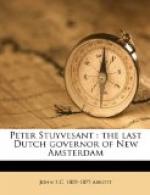Upon the restoration of Charles the Second, in England, the Royalists and churchmen insisted upon the restoration of the hierarchy. The Restoration was far from being the unanimous act of the nation. The republicans and dissenters, disappointed and persecuted, were disposed in ever increasing numbers, to take refuge in the New World. The West India Company of Holland being in possession of a vast territory, between the Hudson and the Delaware, which was quite uninhabited, save by a few tribes of Indians, availed themselves of this opportunity to endeavor to draw emigrants from all parts of Europe, and especially from England, to form settlements upon their lands.
They issued proclamations inviting settlers and offering them large inducements. The country, which embraced mainly what is now New Jersey, was described in glowing terms as if it were a second Eden. And yet there was no gross exaggeration in the narrative.
“This land,” they wrote,
“is but six weeks’ sail from Holland. It is fertile in the extreme. The climate serene and temperate, is the best in the world. The soil is ready for the plough, and seed can be committed to it with scarcely any preparation. The most valuable timber is abundant. The forest presents in profusion, nuts and wild fruit of every description. The richest furs can be obtained without trouble. Deer, turkeys, pigeons and almost every variety of wild game, are found in the woods, and there is every encouragement for the establishment of fisheries.”
Having presented this view of the region, to which emigrants were invited, and having also announced an exceedingly attractive charter of civil and religious privileges which would be granted them, in the following terms the invitation to emigrate was urged:
“Therefore if any of the good Christians, who may be assured of the advantages to mankind of plantations in these latitudes, shall be disposed to transport themselves to said place, they shall have full liberty to live in the fear of the Lord upon the aforesaid good conditions and shall be likewise courteously used.
“We grant to all Christian people of tender conscience, in England or elsewhere oppressed, full liberty to erect a colony between New England and Virginia in America, now within the jurisdiction of Peter Stuyvesant.”
Twenty-three families, most of them French, established a settlement on Long Island, at the place now called Bushwick. The village grew rapidly and in two years had forty men able to bear arms.
The proclamation issued by the Company, inviting emigrants to settle upon the lands between the Hudson and the Delaware, attracted much attention in Europe. Committees were sent to examine the lands which it was proposed thus to colonize. The region between New Amstel and Cape Henlopen, being quite unoccupied, attracted much attention. A company, the members of which may be truly called a peculiar people, decided to settle there. An extraordinary document was drawn up, consisting of one hundred and seventeen articles for the government of the association. In this singular agreement it is written:




